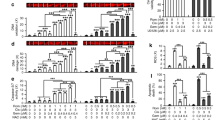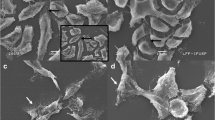Abstract
Genetic abnormalities and epigenetic alterations both play vital role in initiation as well as progression of cancer. Whereas genetic mutations cannot be reversed, epigenetic alterations such as DNA methylation can be reversed by the application of DNA methyltransferase inhibitor decitabine. Epigenetic silencing of RASSF1A and involvement of hippo pathway both have been shown to involve in chemo-resistance. Purpose of this study was to observe the effect of combination treatment of decitabine with cisplatin or doxorubicin on bladder cancer cells involving hippo pathway through RASSF1A. Bladder cancer cells (HT1376 & T24) were treated with decitabine and its effect on RASSF1A expression, hippo pathway molecules (MST & YAP), and its downstream targets (CTGF, CYR61 & CTGF) was observed. Effect of decitabine pretreatment on sensitivity of bladder cancer cells towards chemotherapeutic drugs was also studied. Decitabine treatment leads to restoration of RASSF1A, activation of hippo pathway followed by decreased expression of its oncogenic downstream targets (CTGF & CYR61). Further pretreatment of decitabine enhanced cytotoxicity of cisplatin and doxorubicin to bladder cancer cells.





Similar content being viewed by others
References
Ferlay J, Soerjomataram I, Dikshit R, Eser S, Mathers C, Rebelo M, Parkin DM, Forman D, Bray F (2015) Cancer incidence and mortality worldwide: sources, methods and major patterns in GLOBOCAN 2012. Int J Cancer 136(5):E359-86. https://doi.org/10.1002/ijc.29210
Antoni S, Ferlay J, Soerjomataram I, Znaor A, Jemal A, Bray F (2017) Bladder cancer incidence and mortality: a global overview and recent trends. Eur Urol 71(1):96–108. https://doi.org/10.1016/j.eururo.2016.06.010
Cookson MS, Herr HW, Zhang ZF, Soloway S, Sogani PC, Fair WR (1997) The treated natural history of high-risk superficial bladder cancer: 15-year outcome. J Urol 158:62–67. https://doi.org/10.1097/00005392-199707000-00017
Saxman SB, Propert KJ, Einhorn LH, Crawford ED, Tannock I, Raghavan D, Loehrer PJ Sr., Trump D (1997) Long-term follow-up of a phase III intergroup study of cisplatin alone or in combination with methotrexate, vinblastine, and doxorubicin in patients with metastatic urothelial carcinoma: a cooperative group study. J Clin Oncol 15:2564–2569. https://doi.org/10.1200/JCO.1997.15.7.2564
Sternberg CN, De Mulder P, Schornagel JH et al (2006) Seven year update of an EORTC phase III trial of high-dose intensity M-VAC chemotherapy and G-CSF versus classic M-VAC in advanced urothelial tract tumours. Eur J Cancer 42:50–54. https://doi.org/10.1016/j.ejca.2005.08.032
Naito S, Yokomizo A, Koga H (1999) Mechanisms of drug resistance in chemotherapy for urogenital carcinoma. Int J Urol 6:427–439. (PMID: 10510888)
Stordal B, Davey M (2007) Understanding cisplatin resistance using cellular models. IUBMB Life 59(11):696–699. https://doi.org/10.1080/15216540701636287
Sonpavde G, Sternberg CN, Rosenberg JE, Hahn NM, Galsky MD, Vogelzang NJ (2010) Second-line systemic therapy and emerging drugs for metastatic transitional-cell carcinoma of the urothelium. Lancet Oncol 11:861–870. https://doi.org/10.1016/S1470-2045(10)70086-3
Howell PM, Liu Z, Khong HT (2010) Demethylating agents in the treatment of cancer. Pharmaceuticals 3:2022–2044. https://doi.org/10.3390/ph3072022
Grawenda AM, Neill EO (2015) Clinical utility of RASSF1A methylation in human malignancies. Br J Cancer 113:372–381. https://doi.org/10.1038/bjc.2015.221
Grusche FA, Richardson HE, Harvey KF (2010) Upstream regulation of the hippo size control pathway. Curr Biol 20:R574–R582. https://doi.org/10.1016/j.cub.2010.05.023
Zhang X, Cai G, Wu X et al (2016) Analysis of liver tumor-prone mouse models of the hippo kinase scaffold proteins RASSF1A and SAV1. Cancer Res 76(9):2824–2835. https://doi.org/10.1016/j.cub.2010.05.023
Zhao Q, Dou K (2007) Methylation of Ras association domain family protein 1, isoform A correlated with proliferation and drug resistance in hepatocellular carcinoma cell line SMMC-7721. J Gastroenterol Hepatol 22:683–689. https://doi.org/10.1111/j.1440-1746.2006.04676.x
Kassler S, Donninger H, Birrer MJ, Clark GJ (2012) RASSF1A and the taxol response in ovarian cancer. Mol Biol Int. https://doi.org/10.1155/2012/263267. (Article ID 263267)
Huo X, Zhang Q, Liu AM, Tang C, Gong Y, Bian J, Luk JM, Xu Z, Chen J (2013) Overexpression of Yes-associated protein confers doxorubicin resistance in hepatocellular carcinoma. Oncol Rep 29:840–846. https://doi.org/10.3892/or.2012.2176
Touil Y, Igoudjil W, Corvaisier M et al (2014) Colon cancer cells escape 5FU chemotherapy-induced cell death by entering stemness and quiescence associated with the c-Yes/YAP axis. Clin Cancer Res 20:837–846. https://doi.org/10.1158/1078-0432.CCR-13-1854
Lai D, Ho KC, Hao Y, Yang X (2011) Taxol resistance in breast cancer cells is mediated by the hippo pathway component TAZ and its downstream transcriptional targets Cyr61 and CTGF. Cancer Res 71:2728–2738. https://doi.org/10.1158/0008-5472
Shang D, Liu Y, Matsui Y, Ito N, Nishiyama H, Kamoto T, Ogawa O (2008) Demethylating Agent 5-Aza-2=-Deoxycytidine enhances susceptibility of bladder transitional cell carcinoma to cisplatin. Urology. https://doi.org/10.1016/j.urology.2007.11.029
Plumb JA, Strathdee G, Sludden J, Kaye SB, Brown R (2000) Reversal of drug resistance in human tumor xenografts by 2=-deoxy-5-azacytidine-induced demethylation of the hMLH1 gene promoter. Cancer Res 60:6039–6044
Gomyo Y, Sasaki J, Branch C, Roth JA, Mukhopadhyay T (2004) 5-aza-2=-deoxycytidine upregulates caspase-9 expression cooperating with p53-induced apoptosis in human lung cancer cells. Oncogene 23:6779–6787. https://doi.org/10.1016/j.urology.2007.11.029
Oronsky B, Oronsky N, Knox S, Fanger G, Scicinski J (2014) Episensitization therapeutic tumor re-sensitization by epigenetic agents: a review and reassessment. Anti-Cancer Agents Med Chem 14:1121–1127. (PMCID: PMC4262965)
Van Allen EM, Mouw KW, Kim P et al (2014) Somatic ERCC2 mutations correlate with cisplatin sensitivity in muscle-invasive urothelial carcinoma. Cancer Discov 4:1140–1153. https://doi.org/10.1158/2159-8290.CD-14-0623
Zhao Y, Yang X (2015) The Hippo pathway in chemotherapeutic drug resistance. Int J Cancer 137:2767–2773. https://doi.org/10.1002/ijc.29293
Kim JS, Chae Y, Ha Y-S, Kim IY, Byun SS, Yun S-J, Wun-Jae Kim (2012) Ras association domain family 1A: a promising prognostic marker in recurrent non muscle invasive bladder cancer. Clin Genitourin Cancer 10(2)114–120. https://doi.org/10.1016/j.clgc.2011.12.003
Gao T, Wang S, He B, Pan Y, Song G, Gu L, Chen L, Nie Z, Xu Y, Li R (2012) The association of RAS association domain family protein1A (RASSF1A) methylation states and bladder cancer risk: a systematic review and meta-analysis. PLoS ONE 7:11. e48300. https://doi.org/10.1371/journal.pone.0048300
Lee MG, Kim HY, Byun DS, Lee SJ, Lee CH, Kim JI, Chang SG, Chi SG (2001) Frequent epigenetic inactivation of RASSF1A in human bladder carcinoma. Cancer Res 61:6688–6692
Hong W, Guan KL (2012) The YAP and TAZ transcription co-activators: key downstream effectors of the mammalian Hippo pathway. Semin Cell Dev Biol 23:785–793. https://doi.org/10.1016/j.semcdb.2012.05.004
Sebio A, Lenz HJ (2015) Molecular pathways: Hippo signaling, a critical tumor suppressor. Clin Cancer Res 21(22):5002–5007. https://doi.org/10.1158/1078-0432.CCR-15-0411
Ahn E, Kim J, Gi K, Park Y (2013) RASSF1A-mediated regulation of AREG via the Hippo pathway in hepatocellular carcinoma. Mol Cancer Res 7:11. https://doi.org/10.1158/1541-7786.MCR-12-0665
Zhang H, Pasolli H, Fuchs E (2011) Yes-associated protein (YAP) transcriptional coactivator functions in balancing growth and differentiation in skin. PNAS 108(6):2270–2275. https://doi.org/10.1073/pnas.1019603108
Wang B, Li H, Yang R, Zhou S, Zou S (2014) Decitabine inhibits the cell growth of cholangiocarcinoma in cultured cell lines and mouse xenografts. Oncol Lett 8:1919–1924. https://doi.org/10.3892/ol.2014.2499
Nakamura M, Nishikawa J, Saito M, Sakai K, Sasaki S, Hashimoto S, Okamoto T, Suehiro Y, Yamasaki T, Sakaida I (2017) Decitabine inhibits tumor cell proliferation and up-regulates E-cadherin expression in Epstein-Barr virus-associated gastric cancer. J Med Virol 89:508–517. https://doi.org/10.1002/jmv.24634
Honda S, Haruta M, Sugawara W et al (2008) The methylation status of RASSF1A promoter predicts responsiveness to chemotherapy and eventual cure in hepatoblastoma patients. Int J Cancer 123:1117–1125. https://doi.org/10.1002/ijc.23613
Acknowledgements
Fellowship to M. Khandelwal from Council of Scientific and Industrial Research, India. We acknowledge Dr. P. P. Chattopadhyay (Department of Biochemistry, AIIMS) for providing HeLa cells.
Author information
Authors and Affiliations
Corresponding author
Ethics declarations
Conflict of interest
The authors declare that they have no difference of interest.
Rights and permissions
About this article
Cite this article
Khandelwal, M., Anand, V., Appunni, S. et al. Decitabine augments cytotoxicity of cisplatin and doxorubicin to bladder cancer cells by activating hippo pathway through RASSF1A. Mol Cell Biochem 446, 105–114 (2018). https://doi.org/10.1007/s11010-018-3278-z
Received:
Accepted:
Published:
Issue Date:
DOI: https://doi.org/10.1007/s11010-018-3278-z




